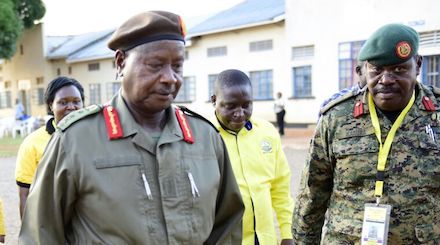Gen. Museveni—a college graduate who fears intellectuals
Ugandan Member of Parliament-elect Ssegirinya Muhammed, also known as “Mr. Update,” has to jump through a number of hoops before being sworn in after winning the Kawempe North MP seat in a landslide.
His opponent Sulaiman Kidandala took him to court and accused him of using High School certificates that were not his. So the presumed loser is not claiming that the voters elected him. He’s complaining that Ssegirinya is an academic imposter. The courts will decide.
This is a learning moment, to review the meaning of education under Gen. Yoweri Museveni’s regime. The ruling National Resistance Movement (NRM) government has deliberately skewed the education system toward civic disempowerment of the Ugandan citizen.
For instance, civic education in Uganda has been suspended or simply tailored to the indoctrination of the masses so that people unthinkingly follow Gen. Museveni. Originally, political education was introduced into the Ugandan curriculum by the NRM government in the mid-1980s.
Back then, the watchword was “siasa” which meant empowering Ugandans with ideological clarity so as to enhance the nation-building process. However when it was quietly dropped from Uganda’s academic syllabus several years ago, it was substituted by a hidden agenda to make politics the sole preserve of the ruling NRM or those who serve its interests.
Gen. Museveni said openly that the question of governance had been “resolved”, which is code for saying “leave the State to me.” At all levels of the body politic whether government, civil society organizations, community based organizations, policy advocacy or educational planning, political education was actively discouraged or debased. Thereupon, political miseducation which fed Gen. Museveni’s cult of personality was vigorously pursued under the thin veneer of “patriotism classes.”
The result was that a clear understanding of how Uganda’s political system or government works was severely reduced amongst Ugandans. According to a certain survey of civic education in educational institutions, “data from the survey revealed that these (political) discussions focus on apolitical topics such as teenage pregnancies, early marriages or alcoholism.”
One student even noted, “It is hard to discuss…issues of society and the world because even teachers fear attacking the evils of the world and society so even as students we develop the fear because we are afraid of being singled out as less patriotic.”
The NRM is fully aware that civic education makes citizens politically alert and thus less likely to become patsies to Gen. Museveni’s misinformation and disinformation machines, so it is against such education. With a society less equipped with political knowledge, Ugandans cannot understand liberal democratic thinking, policy and the need for differing points of view within the political firmament. Hence intolerance is on the rise as we are deprived of civic values based on dialogue, debate and a critical winnowing of fact from fable.
Gone are the days when debates and discussions generated progressive political attitudes in our students and citizens alike. Even in the mainstream media, free and frank discussion has been replaced with with NRM dogmas and the inculcation of fear for authority. We all know that such platitudes—mixed with fear—do not support a critical attitude towards politics.
This deliberate subduing of political acuity and acumen is coupled with glaring signs of restricted free spaces in the public domain. Civil activism has been restricted by draconian strictures such as the NGO Act, enacted in 2016, which severely limits political advocacy. The odious Over The Top tax (OTT), a social media tax, was also introduced in 2018 to tighten government’s grip on discourse and end what the regime calls “gossip” on a multiplicity of social media outlets including WhatsApp, Facebook and Twitter.
So when the spaces for free thought and discussion shrunk, Ugandans felt stifled and frustrated. This made them lash out with abusive language. The opposition Democratic Party President Norbert Mao described as the politics of Kumanyoko—a vulgar word referring to a mother’s private part. Such unseemly politics is similar to the American rise of political diatribe through emotional and political outlets such as gangsta rap, as opposed to progressive hip hop. The rap NWA were vulgar, saying “F” the police. At the same time they were denouncing real police atrocities in the so-called inner cities.
In Uganda, as constructive and critical thinking was discouraged or dumbed down, ghetto scions such as Bobi Wine rose to prominence to become more relevant than intellectuals. He became the voice of the voiceless. In this sense, Gen. Museveni created Bobi Wine and now the chickens are coming home to roost. Indeed Gen. Museveni’s near-sighted policies of stamping out civic-mindedness amongst Ugandans is going to the downfall of his regime.
Where he could’ve intelligently engaged intellectuals of contrasting political persuasions, he now has to contend with being called “a pair of buttocks” by academics like Stella Nyanzi. Now, having shut down the space for intelligent discourse, Gen. Museveni has had to shut down social media and deploy his goons on the streets of Uganda to terrorize urbanites in the name of combating “terrorism.”
Ssegirinya Muhammed might not be as schooled as, say, Speaker of Parliament Rebecca Kadaga. But with the dumbing down of Uganda’s body politic, he is just as equally educated. So the discussion should not be about his academic papers or lack thereof. It should be about how the NRM has destroyed Uganda’s political class because of Gen. Museveni’s deep-seated fear of the intelligentsia.
Columnist Matogo can be reached via mugashop74@gmail.com







